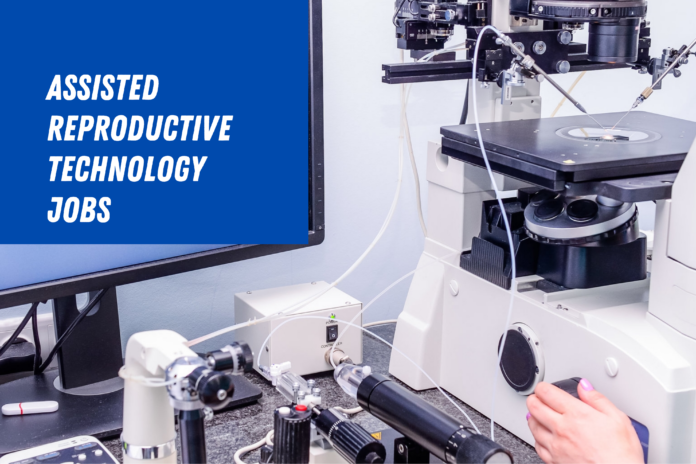The realm of Assisted Reproductive Technology (ART) is witnessing unprecedented growth, providing new hope and possibilities for individuals and couples facing fertility challenges. Alongside this advancement, there is a burgeoning demand for skilled professionals to navigate the complexities of ART. In this blog post, We’ll discuss in this article about assisted reproductive technology jobs.
Table of Contents
Toggleassisted reproductive technology jobs
Embarking on a career in Assisted Reproductive Technology (ART) opens the door to a realm where compassion intersects with cutting-edge science. The diverse array of jobs within ART caters to individuals with various skill sets and interests, all united by the common goal of helping individuals and couples on their journey to parenthood. Whether it’s the hands-on approach of reproductive endocrinologists, We’ll discuss in this article about assisted reproductive technology jobs.
The ART Landscape: A Glimpse into Advancements
Assisted Reproductive Technology encompasses a range of medical procedures and interventions designed to aid conception. From in vitro fertilization (IVF) to surrogacy and egg freezing, ART has become a cornerstone in fertility treatments. As these technologies continue to evolve, so does the need for a diverse workforce equipped with specialized skills and expertise. We’ll discuss in this article about assisted reproductive technology jobs.
Career Paths in Assisted Reproductive Technology:
1. Reproductive Endocrinologist:
At the forefront of ART, reproductive endocrinologists are medical doctors specializing in fertility. They diagnose and treat reproductive disorders, overseeing fertility treatments such as IVF, intrauterine insemination (IUI), and hormonal therapies. Becoming a reproductive endocrinologist requires a medical degree, followed by residency and fellowship training in reproductive endocrinology. We’ll discuss in this article about assisted reproductive technology jobs.
2. Embryologist:
Embryologists play a pivotal role in the laboratory aspects of ART. They handle eggs and sperm, facilitate fertilization, and manage the development of embryos. An educational background in embryology, often with a focus on reproductive science, is essential for this career. Many embryologists also pursue certification through organizations such as the American Board of Bioanalysis. We’ll discuss in this article about assisted reproductive technology jobs.
3. Andrologist:
Andrologists specialize in male reproductive health, assessing and managing sperm-related issues. They play a crucial role in procedures like sperm analysis, sperm cryopreservation, and testicular sperm extraction. A bachelor’s degree in a relevant field, such as biology or clinical laboratory science, is typically required for this role.
4. Fertility Nurse:
Fertility nurses provide patient care and support throughout the ART process. They educate patients on treatment protocols, administer medications, and assist in various procedures. Becoming a fertility nurse typically involves earning a nursing degree and gaining experience in reproductive health.
5. Genetic Counselor:
With the growing emphasis on genetic screening and testing in ART, genetic counselors help individuals understand the genetic aspects of fertility treatments. They assess genetic risks, provide counseling, and guide patients through decisions related to reproductive genetics. A master’s degree in genetic counseling is the standard educational requirement.
6. Fertility Coach or Counselor:
Fertility coaches or counselors offer emotional and psychological support to individuals and couples navigating the challenges of infertility. This role often requires a background in counseling or psychology, with some professionals specializing in fertility-specific coaching.
The Evolving Landscape and Future Trends:
As ART continues to advance, new career opportunities are likely to emerge. Advancements in artificial intelligence, telemedicine, and personalized medicine are shaping the future of fertility treatments. Professionals with expertise in these areas will be increasingly sought after to contribute to the ongoing evolution of ART. We’ll discuss in this article about assisted reproductive technology jobs.
Challenges and Rewards:
While careers in Assisted Reproductive Technology offer immense fulfillment by helping individuals build families, it’s essential to acknowledge the challenges. Dealing with the emotional and ethical aspects of fertility treatments can be demanding. However, the rewards of witnessing successful outcomes and being a part of a transformative journey toward parenthood often outweigh the challenges. We’ll discuss in this article about assisted reproductive technology jobs.
Conclusion:
Navigating the landscape of Assisted Reproductive Technology careers requires a blend of medical expertise, scientific knowledge, and compassionate care. As technology continues to redefine the possibilities in fertility treatments, the demand for skilled professionals in ART is expected to grow. individuals in these roles contribute significantly to making dreams of parenthood a reality. Aspiring professionals in the field of Assisted Reproductive Technology hold the key to shaping the future of fertility care, providing hope and guidance to those on the path to building their families.
Also Read: maytag commercial technology washer

